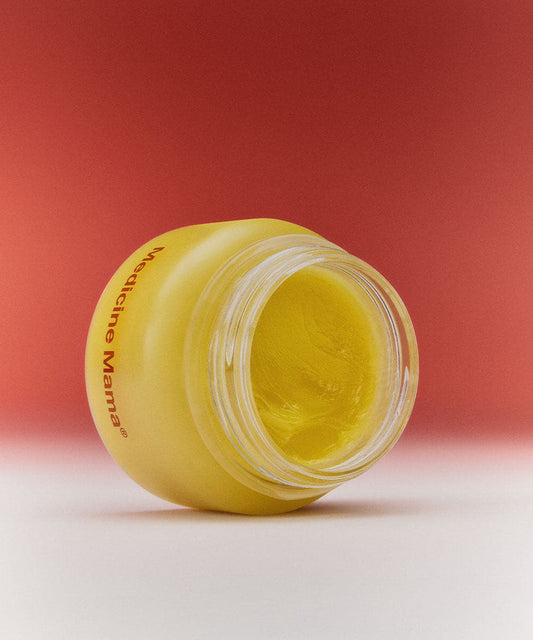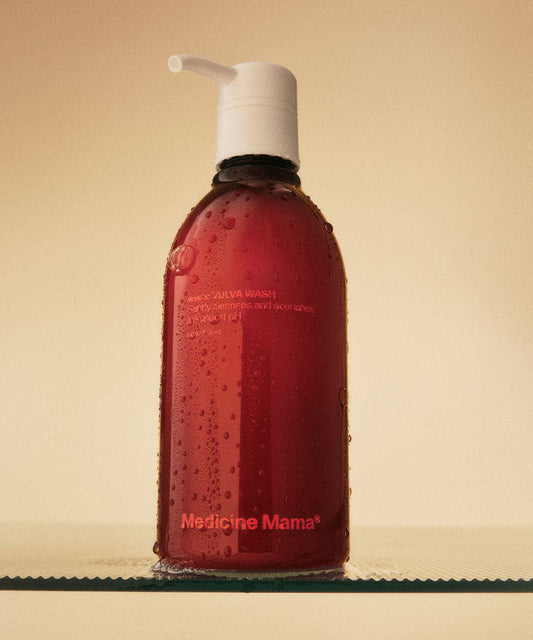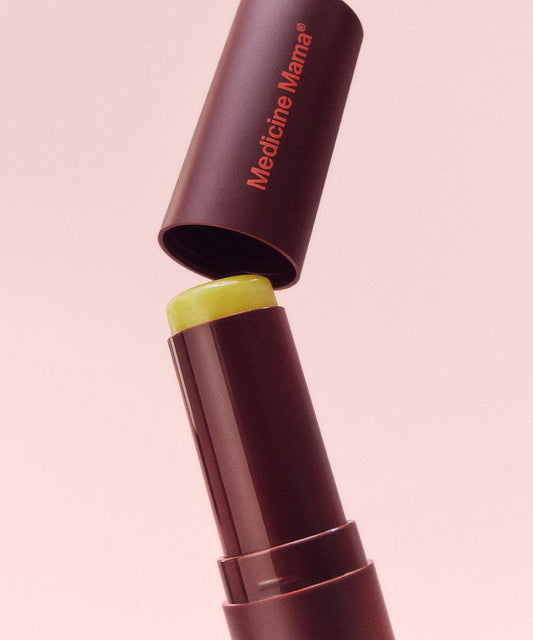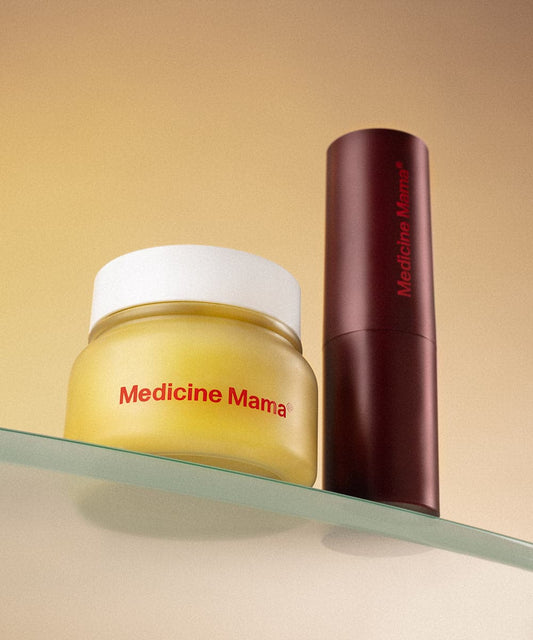Reviewed by | Melinda Hany, Registered Nurse
Key Takeaways
- Outercourse is a valid, satisfying form of sex that doesn’t involve penetration.
- It can help you stay connected and feel good without pushing through pain or discomfort.
- Small shifts (like better communication, external moisture, and curiosity) can make a big difference.
Let’s get one thing straight: sex doesn’t have to mean penetration. And if that part of intimacy has started feeling uncomfortable, stressful, or downright painful, it’s okay to take a different route.
At Medicine Mama, we talk to a lot of women who feel like they’ve hit a wall — emotionally and physically — when sex starts to hurt. But there’s more than one way to stay close, connected, and satisfied.
Outercourse is not a compromise. It’s sex, full stop. Just without the part that’s currently not feeling great. Curious about how it works? We’ve got you.
What Does Outercourse Actually Look Like?
There’s no single definition or rulebook, which is kind of the point. Outercourse is about exploring intimacy without penetration, but that still leaves a lot on the table.
For some couples, it’s mutual masturbation or using toys externally. For others, it’s kissing, oral, skin-to-skin touch, dry humping, massage, taking a bath together, or just doing the kind of foreplay that usually gets rushed through.
The beauty of outercourse is that it’s customizable. You can focus on what feels good, not what you’re “supposed” to do. That might mean slowing down and paying more attention to sensations you’d normally breeze past, or re-discovering turn-ons that got sidelined by routine. It doesn’t have to look a certain way. It just has to feel good (and consensual, always).
Why Might You Want To Try Outercourse?
If penetration has become physically uncomfortable, emotionally triggering, or just not clicking the way it used to, outercourse gives you a different way to stay connected without ignoring your body’s signals. It can be especially helpful during menopause, postpartum, recovery, or any season where things feel off and you need a new approach.
But it’s not just about avoiding pain. For a lot of people, outercourse is actually more satisfying because there’s less pressure to perform and more space to be present. You’re not racing toward a goal or acting out a script. You’re tuning in, checking in, and exploring what feels good right now.
It’s also a way to rebuild intimacy if things have felt distant or disconnected. Trying something new (and communicating about it) can shift the vibe from “we’re stuck” to “we’re figuring this out together.” And that, honestly, is pretty sexy.
What Are Some Tips To Make It Great?
Ready to give outercourse a try? Keep these tips in mind for more comfort, more connection, and (yes) more pleasure.
Get Comfortable Saying What You Want
You’re not high-maintenance for having preferences. You’re a human being. And when it comes to sex — especially when you’re shifting gears — being vocal about what works and what doesn’t makes everything better.
This doesn’t mean launching into a formal debrief. You don’t need a flowchart. Just simple cues like “slower,” “softer,” or “let’s try this instead” can go a long way. You’re allowed to pivot in real time. You’re allowed to change your mind.
And the truth? Most partners appreciate the clarity. No one wants to guess what feels good — they want to know.
So if it helps, practice those phrases ahead of time. Say them out loud. Make them yours. The more natural it feels to speak up, the easier it is to relax and enjoy what’s actually happening. “Plus, dirty talk can be a huge turn-on all on its own — and incredibly empowering,” notes Melinda Hany, Registered Nurse.
Use Moisture Where You Need It
Even without penetration, dryness can sneak in and ruin the vibe. Friction is friction, and when your skin’s already sensitive, you’ll feel it fast. That’s why external moisture isn’t optional — it’s a game-changer.
Daily hydration (think: a clean, hormone-free vulva balm) helps keep the skin soft, soothed, and ready. And during intimacy, a water-based lubricant like Intimate Glide can make everything feel smoother, gentler, and way more enjoyable (even without traditional penetration). It’s made with organic aloe and designed to work with your body, not against it.
Intimacy doesn’t have to start at “go.” It can start with a little prep that makes the rest of it feel way better.
Try Toys — Without the Pressure
Toys aren’t just for penetration. In fact, some of the best ones never go in at all. There are tons of options out there designed for external stimulation — vibrators, suction toys, wands, you name it — and they can seriously level things up.
This doesn’t mean you have to pull out an entire collection on date night. It’s not about performance. It’s about play. Use toys solo or with a partner, explore different sensations, and remember: you’re allowed to have fun figuring it out.
And if you’re not sure where to start? That’s normal too. You don’t need to be an expert — just curious. Let it be easy.
When Should You Talk to a Doctor?
If you’re navigating painful sex or discomfort during intimacy, you don’t need to hit some arbitrary threshold to “deserve” a check-in. If something feels off (physically or emotionally), that’s reason enough to bring it up.
That said, there are a few signs it might be time to get professional support:
-
The pain is persistent or getting worse. You’ve tried slowing down, switching things up, and using moisture, and it’s still not working. A doctor can help rule out anything underlying and talk you through other options.
-
You’re noticing bleeding, itching, or burning, especially if it shows up after non-penetrative activity or doesn’t go away with gentle care. These symptoms might be tied to dryness or thinning tissue, but it’s worth a closer look.
-
It’s impacting your well-being. If you're feeling disconnected from your partner, avoiding intimacy altogether, or constantly worried about pain, that’s a big deal. You deserve to feel safe and supported in your body and in your relationships.
- You just want answers. No need to wait for a crisis. Sometimes it’s helpful just to hear, “Yep, that’s normal,” or “Here’s something that might help.” Validation matters.
Your comfort isn’t a luxury. It’s a baseline. And getting clarity from a provider you trust can be the first step to feeling like yourself again.
Frequently Asked Questions
Can outercourse still lead to orgasm?
Absolutely. In fact, for many people with vulvas, external stimulation (like clitoral touch) is the most reliable way to get there. Penetration isn’t required, and it never has been. If anything, outercourse puts more attention on what actually works for your body.
What if my partner isn’t on board?
This can be tricky, but it’s not a dead end. Start by sharing what’s going on in your body and why you want to try something different. Keep it about you, not what they’re doing “wrong.” Most people want their partner to feel good — they just need to understand what that looks like now. Open convo > quiet resentment.
Is outercourse just a menopause thing?
Not at all. People of all ages and stages choose outercourse for all kinds of reasons — stress, trauma recovery, personal preference, postpartum healing, you name it. Menopause might be why you’re exploring it now, but it’s not the only context where it matters. Great sex has never been one-size-fits-all.
Let’s Redefine What Sex Can Look Like
You don’t have to settle for painful, disconnected, or “just get through it” intimacy, no matter what phase of life you’re in. Outercourse is one of many ways to reconnect with your body, your partner, and your own definition of what satisfying sex looks like. It’s not about lowering the bar. It’s about raising the standard for how you want to feel.
At Medicine Mama, we’re here for all of it: the awkward questions, the real conversations, and the products that support your body’s changing needs with zero judgment and a lot of care.
Disclaimer: The information provided on this blog is for general informational and educational purposes only. All content, including text, images, graphics, and other material, is not intended to be a substitute for professional medical advice, diagnosis, or treatment.
Always seek the guidance of your physician or other qualified health professional with any questions you may have regarding a medical condition, treatment, or wellness program. Never disregard the advice of a medical professional or delay in seeking it because of something you have read on this website.
Sources:
Abstinence and Outercourse | Planned Parenthood
Dyspareunia (Painful Intercourse): Causes & Treatment | Cleveland Clinic
What Women Need to Know About Pain During Sex | Cedars-Sinai
What is an Orgasm, Types of Orgasms & Health Benefits | Cleveland Clinic



